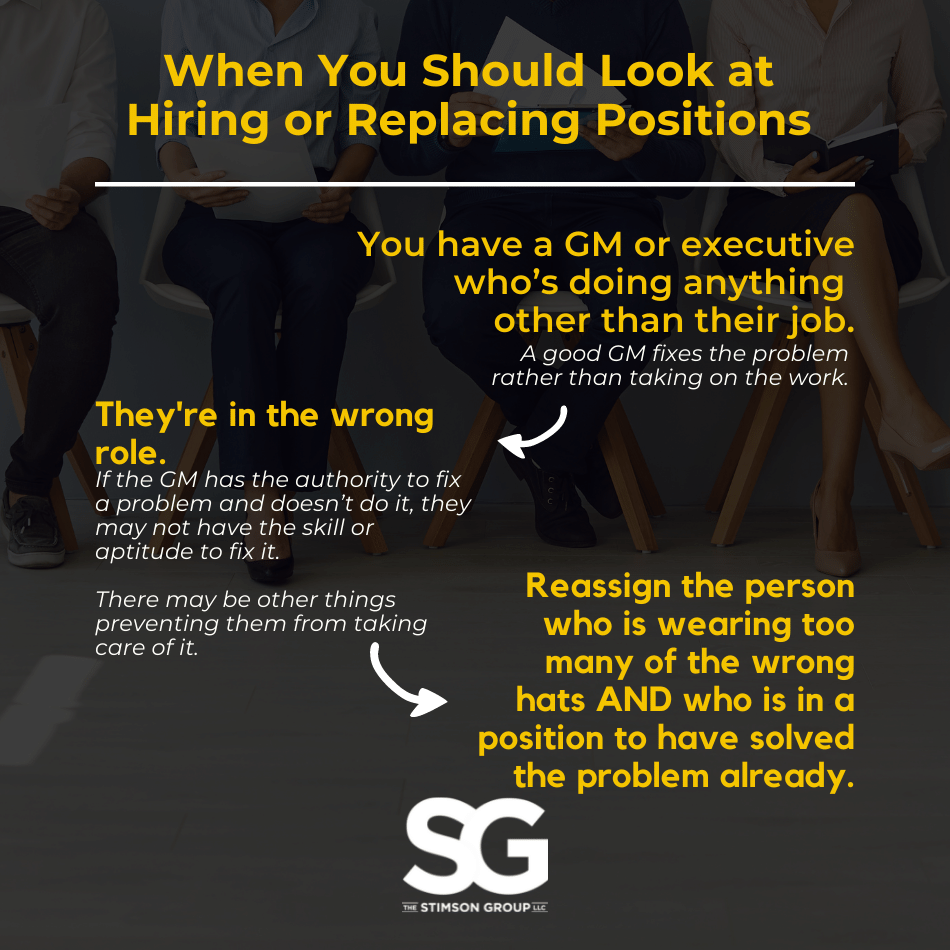
A lot of owners are trying to phase themselves out of managing their businesses or coming up with an exit strategy. In many cases, they want to find more time for themselves.
To accomplish this, they often need to put a General Manager (GM) in place. So, the first thing they do is look at their team to find the person who can step into that role. Why? They’re afraid to bring in a GM from the outside.
Most of the other GMs they’ve seen came up through their respective companies. It’s the way things are done. Furthermore, the people on your team already know your business. They don’t have to learn it.
So the story goes. Best to play it safe.
Additionally, owners are afraid of what they’d have to spend for an external hire. They’d rather pay an internal employee for what they perceive the job is worth than hire from outside and pay what the marketplace says the job is worth.
If an owner hires somebody from inside, the other employees will think, “They’re not making that much more money than me. It’s okay.”
Owners forget to consider that by bringing somebody in from the outside, the people already on the team have no salary context. Maybe the new GM was Chief Operating Officer at another company. If this is the case, they’re probably expensive. Your people will be comfortable with this because they don’t have that kind of experience to bring to the table.
The Pervasive Peter Principle
This is why so many businesses fall prey to the Peter Principle. The Peter Principle is what happens when employees in a company are promoted because they’re good at their jobs. They continue being promoted until, eventually, they reach a job in which they’re no longer competent.
When looking at a business’s organizational chart, I can almost always tell who has been at the company the longest by their position on the chart. The higher you are on the chart, the longer you’ve been at that company. It has nothing to do with skills or capabilities. It’s all about longevity.
Hiring from within may be the norm, but that doesn’t mean it’s best. Why? Because skills from one job — say, in some aspect of delivery — do not necessarily translate to another job, like management.
In reality, you should be hiring someone who is overqualified for executive positions, who can lead your company into the future.
In other words, you want to hire somebody to run the company you expect to have in five years, not the one you have today.
Why? Overqualified hires are going to solve your today problems quickly, and then look around for something else to improve. Then they’re going to want to pull your business forward. It’s what they’re good at.
Increasing Capacity Doesn’t Depend on Adding More People
If capacity is an issue, you may feel like you need to hire more people in delivery. But hiring a highly qualified person who can lead you into the future also addresses capacity problems.
The outside hire is generally going to replace a manager who was too involved with delivery, which is under a capacity constraint. What you need is a manager who can take a step back and find ways to solve delivery issues, remove obstacles, and streamline processes.
If everybody in your company is focused on doing the job that you’ve sold, then nobody is focused on making that job easier to do next time.
So if your GM is also your top designer, your top project manager, or your top salesperson, they won’t focus on being a GM. They’ll focus on what they’re good at, on what they already know.
By hiring a highly qualified manager, you actually relieve the person they replace of an extra burden so they can focus on what they’re good at (and what they were going to do anyway).
A good GM frees up other people by clearing up problems and streamlining processes so they can focus on their jobs. Resources are provided. Obstacles are removed. Capacity expands. Everything runs so much more efficiently.
So when you do need to add more people, they come into an already more efficient organization.
Alternatively, you can outsource more jobs. The biggest obstacle to outsourcing that I see is not having management in a position to source and cultivate suppliers.
Not Just GMs
Not all positions, of course, need to be hired from the outside. This strategy best suits GM and executive-level positions.
Most businesses are composed of Sales, Operations, Finance, and General Management. Those four roles are the most likely to need a higher level of attention.
Do you need a better person than you have right now? If you’re trying to grow and expand your business, the answer is probably yes.
The Unfortunate Truth About People Growing Into New Roles
The fact is, there’s a limit on people’s skill sets and capacities.
Most people are hired because they’re adept at performing a specific role in the business. Maybe someone is good at planning shows or managing a warehouse.
What we often neglect in the hiring of senior management is seeking out people who are good at designing and building processes and growing a business. These are skill sets of a different kind. They’re not necessarily industry specific.
It’s true, then, that you might hire an extremely qualified GM who doesn’t know anything about your business. But what you’ll have is a qualified GM who can learn how to support the people who do know the specifics of your business.
It’s much more difficult to do it the other way around. Someone may really know your industry, but can they learn how to be an effective financial manager, strategic planner, marketing expert, and GM? That’s a highly specialized and completely different set of skills.
Executive positions are not something people can usually grow into. When they do, they’re by far the exception to the rule.
When You Should Look at Hiring or Reassigning Positions
If you have a GM or another executive who’s doing anything with their time (sales, project management, accounts payable, etc.) other than the work of a GM, they’re the wrong person for the job.
A good GM fixes the problem rather than taking on the work.
If the GM has the authority to fix a problem and doesn’t do it, they may not have the skill or aptitude to fix it. There may be other things preventing them from taking care of it. I’m not saying it’s their fault. I’m just saying they’re in the wrong role.
Look for the people who are wearing too many of the wrong hats AND who are in a position to have solved the problem already. That’s the person you need to reassign.

Is It Okay to Make Exceptions?
When growing your business and achieving greater things is no longer important to you, it’s okay to make an exception on this point.
That sounds like a self-righteous answer, I know. But it’s true. The smack of truth stings, but it wakes people up.
Owners looking to find more time for themselves need their business to thrive. If it doesn’t, they’ll just get pulled back into managing the business again, dealing with messes Peter couldn’t clean up. And if that’s the case, why have a GM in the first place?





Leave a Reply